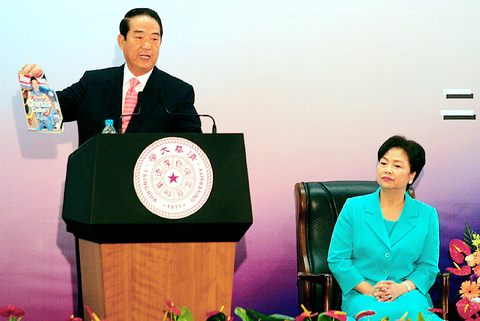The people of both Taiwan and China must work together to welcome the 21st century, People First Party (PFP) Chairman James Soong (宋楚瑜) said yesterday in a speech to university students in Beijing, while emphasizing that Taiwanese independence is not representative of the people of Taiwan.
"However large the world is, is how large the opportunity for China is. Let us together seize this chance, with our hands interlocked and hearts connected, with our feet firmly on the ground, to welcome a 21st century that is in waiting for the Chinese people of both sides [of the Taiwan Strait]," Soong said, speaking to students at Tsinghua University yesterday.
During his stop at the elite Chinese university, which was part of his scheduled agenda for a historic, nine-day tour of China, Soong spoke about the relationship between Taiwan and China.

PHOTO: EPA
Throughout his speech, Soong said that the consolidation of Taiwanese consciousness in the years of the nation's self-rule should not be equated with the Taiwanese independence movement.
Those advocating Taiwanese independence do not represent the island, Soong said.
Whereas Taiwanese consciousness is the natural result of a long passage of history and recognizes the connection between the people of Taiwan and the land, Soong said, Taiwanese independence is a plan to completely cut off Taiwan from the mainland.
"It cannot be denied; Taiwanese consciousness has been manipulated by Taiwanese independence. However, this sort of political scheme has confused the real voices of the Taiwanese people," Soong said in the speech.
Furthermore, he said, while the PFP has a strong love for its Taiwanese homeland and a sense of Taiwanese consciousness, it also has a deep bond to all the Chinese people and is adamantly against Taiwanese independence.
"Our long-standing position is that Taiwanese independence is a dead-end and has never been a feasible option for the PFP," he said.
Despite Soong's emphasis on his party's love for Taiwan, however, he made no mention of the party's, and his, often-stated support for the Republic of China in the speech, choosing to merely focus on the nation's economic success, labeling it the "Taiwan experience," and on his connection to China.
The basic way to solve the problems between China and Taiwan, is not through military means but through the common wishes of the political talent on both sides for the good of the people, Soong said. The future of both countries depends on the deepening of mutual understanding, he added.
"Only by placing the good of the people as their first priority will both sides of the Taiwan Strait exert all efforts to find a resolution acceptable to both sides. In mathematical terms, we must find the greatest common denominator of both sides," Soong said.
"Both sides are my home. On one side are my ancestors, but on the other are our descendants. No one is willing to give up one side in order to win the acknowledgement of the other," Soong said.
Soong also indirectly criticized the current administration when responding to a student's question about President Chen Shui-bian's (陳水扁) decision to decline China's offer to reduce customs duties on a number of Taiwanese agricultural products.
In answering the question, Soong said the reason the government has decided not to accept an offer that would clearly help the Taiwanese people, is because certain individuals have confused thinking and have not thought the issue through.

An essay competition jointly organized by a local writing society and a publisher affiliated with the Chinese Communist Party (CCP) might have contravened the Act Governing Relations Between the People of the Taiwan Area and the Mainland Area (臺灣地區與大陸地區人民關係條例), the Mainland Affairs Council (MAC) said on Thursday. “In this case, the partner organization is clearly an agency under the CCP’s Fujian Provincial Committee,” MAC Deputy Minister and spokesperson Liang Wen-chieh (梁文傑) said at a news briefing in Taipei. “It also involves bringing Taiwanese students to China with all-expenses-paid arrangements to attend award ceremonies and camps,” Liang said. Those two “characteristics” are typically sufficient

A magnitude 5.9 earthquake that struck about 33km off the coast of Hualien City was the "main shock" in a series of quakes in the area, with aftershocks expected over the next three days, the Central Weather Administration (CWA) said yesterday. Prior to the magnitude 5.9 quake shaking most of Taiwan at 6:53pm yesterday, six other earthquakes stronger than a magnitude of 4, starting with a magnitude 5.5 quake at 6:09pm, occurred in the area. CWA Seismological Center Director Wu Chien-fu (吳健富) confirmed that the quakes were all part of the same series and that the magnitude 5.5 temblor was

The brilliant blue waters, thick foliage and bucolic atmosphere on this seemingly idyllic archipelago deep in the Pacific Ocean belie the key role it now plays in a titanic geopolitical struggle. Palau is again on the front line as China, and the US and its allies prepare their forces in an intensifying contest for control over the Asia-Pacific region. The democratic nation of just 17,000 people hosts US-controlled airstrips and soon-to-be-completed radar installations that the US military describes as “critical” to monitoring vast swathes of water and airspace. It is also a key piece of the second island chain, a string of

The Central Weather Administration has issued a heat alert for southeastern Taiwan, warning of temperatures as high as 36°C today, while alerting some coastal areas of strong winds later in the day. Kaohsiung’s Neimen District (內門) and Pingtung County’s Neipu Township (內埔) are under an orange heat alert, which warns of temperatures as high as 36°C for three consecutive days, the CWA said, citing southwest winds. The heat would also extend to Tainan’s Nansi (楠西) and Yujing (玉井) districts, as well as Pingtung’s Gaoshu (高樹), Yanpu (鹽埔) and Majia (瑪家) townships, it said, forecasting highs of up to 36°C in those areas